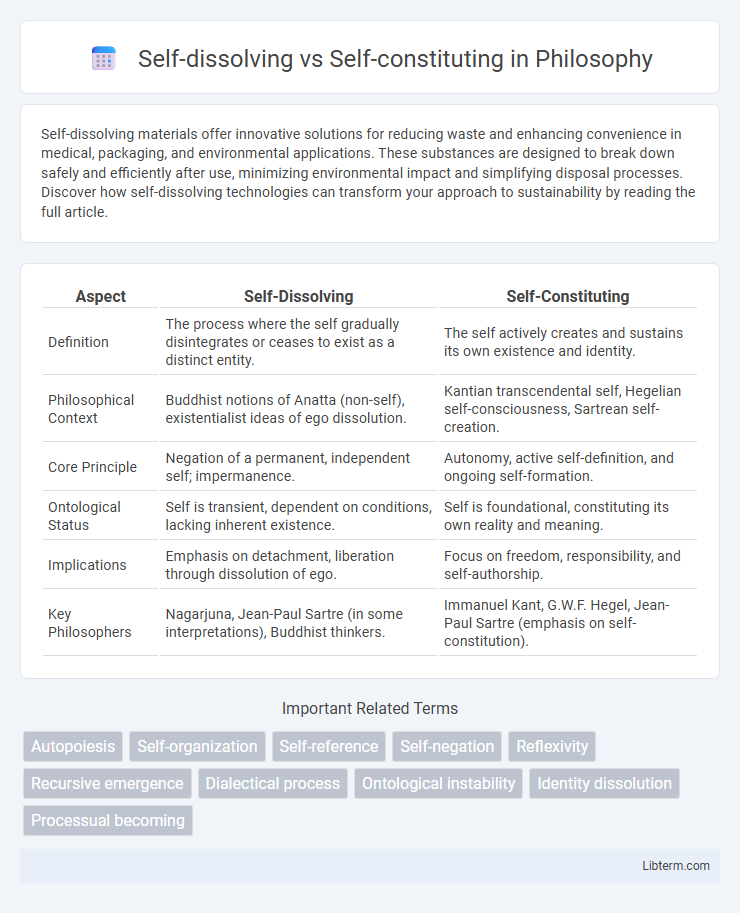Self-dissolving materials offer innovative solutions for reducing waste and enhancing convenience in medical, packaging, and environmental applications. These substances are designed to break down safely and efficiently after use, minimizing environmental impact and simplifying disposal processes. Discover how self-dissolving technologies can transform your approach to sustainability by reading the full article.
Table of Comparison
| Aspect | Self-Dissolving | Self-Constituting |
|---|---|---|
| Definition | The process where the self gradually disintegrates or ceases to exist as a distinct entity. | The self actively creates and sustains its own existence and identity. |
| Philosophical Context | Buddhist notions of Anatta (non-self), existentialist ideas of ego dissolution. | Kantian transcendental self, Hegelian self-consciousness, Sartrean self-creation. |
| Core Principle | Negation of a permanent, independent self; impermanence. | Autonomy, active self-definition, and ongoing self-formation. |
| Ontological Status | Self is transient, dependent on conditions, lacking inherent existence. | Self is foundational, constituting its own reality and meaning. |
| Implications | Emphasis on detachment, liberation through dissolution of ego. | Focus on freedom, responsibility, and self-authorship. |
| Key Philosophers | Nagarjuna, Jean-Paul Sartre (in some interpretations), Buddhist thinkers. | Immanuel Kant, G.W.F. Hegel, Jean-Paul Sartre (emphasis on self-constitution). |
Introduction to Self-Dissolving and Self-Constituting
Self-dissolving entities cease to exist by virtue of their own nature or internal processes, effectively ending their identity without external intervention. Self-constituting entities, in contrast, actively maintain and recreate their own structure and identity through internal mechanisms, ensuring continuous existence. These concepts are pivotal in metaphysics and ontology for understanding the conditions under which entities persist or terminate.
Defining Self-Dissolving: Meaning and Context
Self-dissolving refers to a process or entity that gradually disappears or loses its distinct identity over time within a given context. In philosophical or organizational frameworks, it denotes the fading of boundaries or structures as they integrate into a larger whole or cease to exist independently. This concept contrasts with self-constituting, which involves an entity actively forming or maintaining its own identity and structure.
Understanding Self-Constituting: Core Concepts
Self-constituting refers to the process by which an entity or system inherently generates and maintains its own identity and structure through internal mechanisms, contrasting with self-dissolving, where an entity loses coherence and breaks down. Core concepts of self-constituting include autonomy, self-maintenance, and operational closure, emphasizing how systems actively produce and regulate their components to sustain existence. This principle is central in fields like biology, philosophy, and systems theory, explaining how living organisms and complex systems preserve their identity despite external influences.
Historical Perspectives on Self-Dissolving and Self-Constituting
Historical perspectives on self-dissolving and self-constituting concepts reveal contrasting understandings in philosophy and psychology. Self-dissolving views, often rooted in Buddhist and certain Western existential traditions, emphasize the impermanence and fluidity of identity, suggesting the ego or self is a transient construct rather than a fixed entity. In contrast, self-constituting theories, prominent in Kantian philosophy and modern cognitive science, argue that the self is an active agent continuously shaping its identity through reflection and intentional action.
Psychological Implications of Self-Dissolving
Self-dissolving involves the temporary submersion of the ego or self-identity, often leading to experiences of ego loss and altered states of consciousness that can reduce anxiety and enhance emotional resilience. Psychological implications include increased cognitive flexibility, decreased rigid self-boundaries, and a potential for profound personal transformation through diminished self-referential processing. This state can be therapeutic in treating conditions such as depression and PTSD by facilitating a sense of connectedness and reducing maladaptive self-focus.
The Role of Self-Constituting in Personal Development
Self-constituting plays a crucial role in personal development by enabling individuals to actively shape their identity and values through conscious decisions and actions. Unlike self-dissolving, which involves the erosion or loss of a fixed sense of self, self-constitution fosters resilience and continuous growth by integrating experiences into a coherent self-concept. This process empowers sustained self-awareness and adaptive transformation essential for achieving long-term personal goals.
Comparative Analysis: Self-Dissolving vs Self-Constituting
Self-dissolving processes emphasize the gradual disintegration or elimination of existing structures, prioritizing decay and termination within systems or materials. Self-constituting mechanisms focus on the autonomous formation and maintenance of structures, highlighting self-organization and sustainable regeneration. Comparative analysis reveals that self-dissolving systems often serve as transitional phases, while self-constituting systems enable continuous adaptation and resilience.
Practical Examples in Everyday Life
Self-dissolving phenomena, such as melting ice or evaporating water, illustrate how physical structures can disappear without external intervention, highlighting transient states in everyday life. Self-constituting processes, like the formation of a honeybee colony or the growth of a plant, demonstrate systems that autonomously organize and sustain themselves through internal mechanisms. These examples reveal the contrast between systems that naturally disintegrate and those that maintain or build complexity through self-regulation.
Philosophical and Ethical Considerations
Self-dissolving theories emphasize the cessation or transformation of the self as a path to alleviating suffering and achieving enlightenment, often rooted in Buddhist philosophy and ethical frameworks that prioritize non-attachment and impermanence. Self-constituting approaches argue for the self as an active agent that creates identity through ongoing experiences and choices, raising questions about moral responsibility and autonomy in existentialist and constructivist ethics. The debate between these perspectives explores fundamental notions of personal identity, moral accountability, and the implications for ethical behavior in both individual and societal contexts.
Conclusion: Choosing Between Self-Dissolving and Self-Constituting
Choosing between self-dissolving and self-constituting concepts depends on the desired emphasis on identity persistence versus transformation. Self-dissolving highlights fluidity and continuous change, ideal for dynamic systems adapting over time. Self-constituting underscores stability and self-maintenance, suitable for entities requiring consistent self-identity and autonomy.
Self-dissolving Infographic

 libterm.com
libterm.com